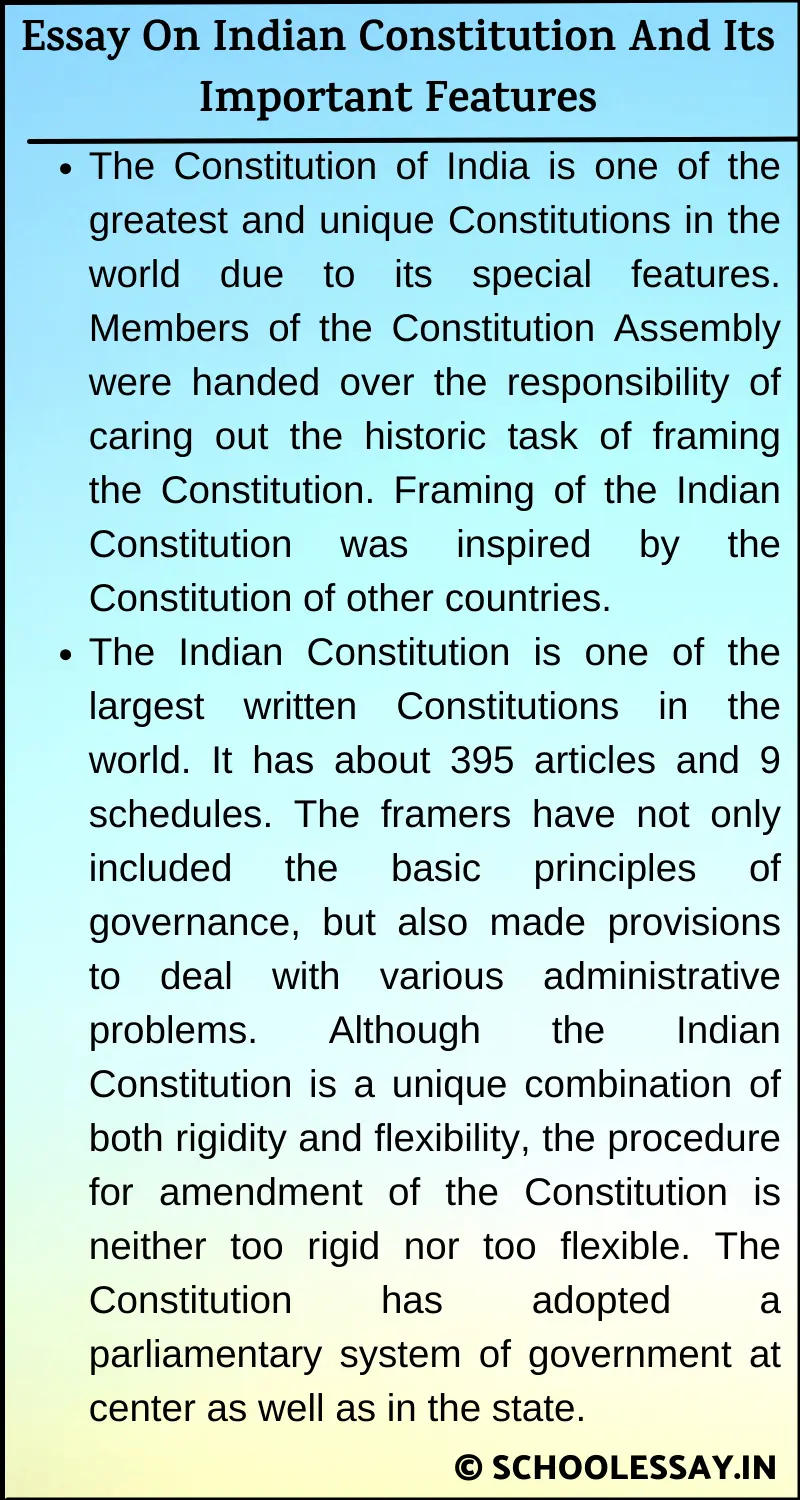Essay On Indian Constitution And Its Important Features
The Constitution of India is one of the greatest and unique Constitutions in the world due to its special features. Members of the Constitution Assembly were handed over the responsibility of caring out the historic task of framing the Constitution. Framing of the Indian Constitution was inspired by the Constitution of other countries.
The Indian Constitution is one of the largest written Constitutions in the world. It has about 395 articles and 9 schedules. The framers have not only included the basic principles of governance, but also made provisions to deal with various administrative problems. Although the Indian Constitution is a unique combination of both rigidity and flexibility, the procedure for amendment of the Constitution is neither too rigid nor too flexible. The Constitution has adopted a parliamentary system of government at center as well as in the state.
The executive powers are exercised by the Council of Ministers handed by the Prime Minister. The secular nature of the state is one of themost important features of the Constitution. India has adopted the principle of secularism and thus, making difference between people based on religion is prohibited. Indian secularism provides freedom to practice any religion according to the individual’s choice.
Certain fundamental rights are granted by the Constitution to its citizens. These rights are applied by the Supreme Court of India. They include Right to Equality, Right to Freedom, Right against Exploitation, Right to Religious freedom, Cultural and Educational rights, Right to Property and Right to Constitutional Remedies.
The Constitution of India makes judiciary of India truly independent. It protects people from exploitation. The Supreme Court is free from all the political influence and it acts as a true guardian of the Constitution. It provides complete independence to Judges.
The Directive Principles of the State policy is another striking feature of the Constitution. It states free and compulsory primary education until the age of 14 years. The Directive Principles provide guidelines to the Government of India to look after the welfare of people. Some of the important Directive Principles include – sufficient means of livelihood, equal distribution of wealth, equality of employment, protecting people against exploitation, free and compulsory education, promoting backward classes, international co-operation and enforcing Civil Code for whole country.
The Constitution of India provides single citizenship. Any person belonging to any part of the country is allowed single citizenship. There is no provision for the state citizenship.
Emergency provision power is in the hands of President of India. The President on the advice of Union of Council of Ministers declares emergency when a critical situation arises in the country. The powers of the state are fully suspended during such situations. Thus, Indian Government becomes centralized during the time of emergency.
The Constitution has introduced that all the citizens who have attended the age of 18 and more are entitled to exercise their votes and contest for election. Moreover, sovereign democratic republic makes India fully sovereign. India is not dependent or controlled by any outside authorities. People choose their representatives through elections. Thus, the Constitution of India has declared India as republic.

ALSO READ:
- Essay On India’s Mars Orbiter Mission (MOM)
- Essay On India’s Space Programme
- Essay On Indus Valley Its Town Planning And Civil Life
- Essay On Industrial Revolution And Its Causes
- Essay On Importance of Good Manners
- Essay On Importance of Physical Education In Schools
- Essay On India Can Become A World Power
- Essay On The India of My Dreams
- Essay On Importance of English Language
- Essay On Importance And Uses Of Electricity

